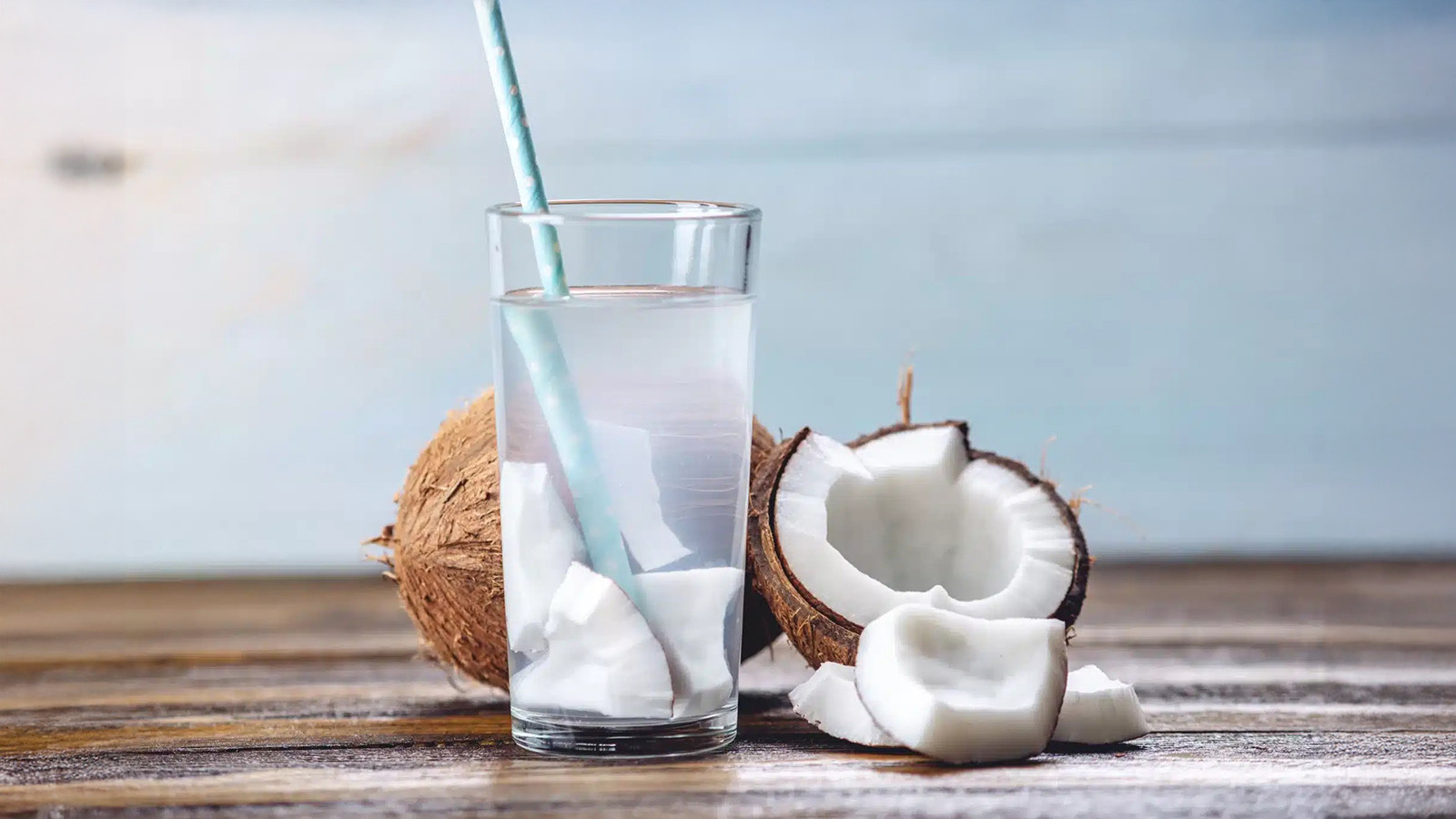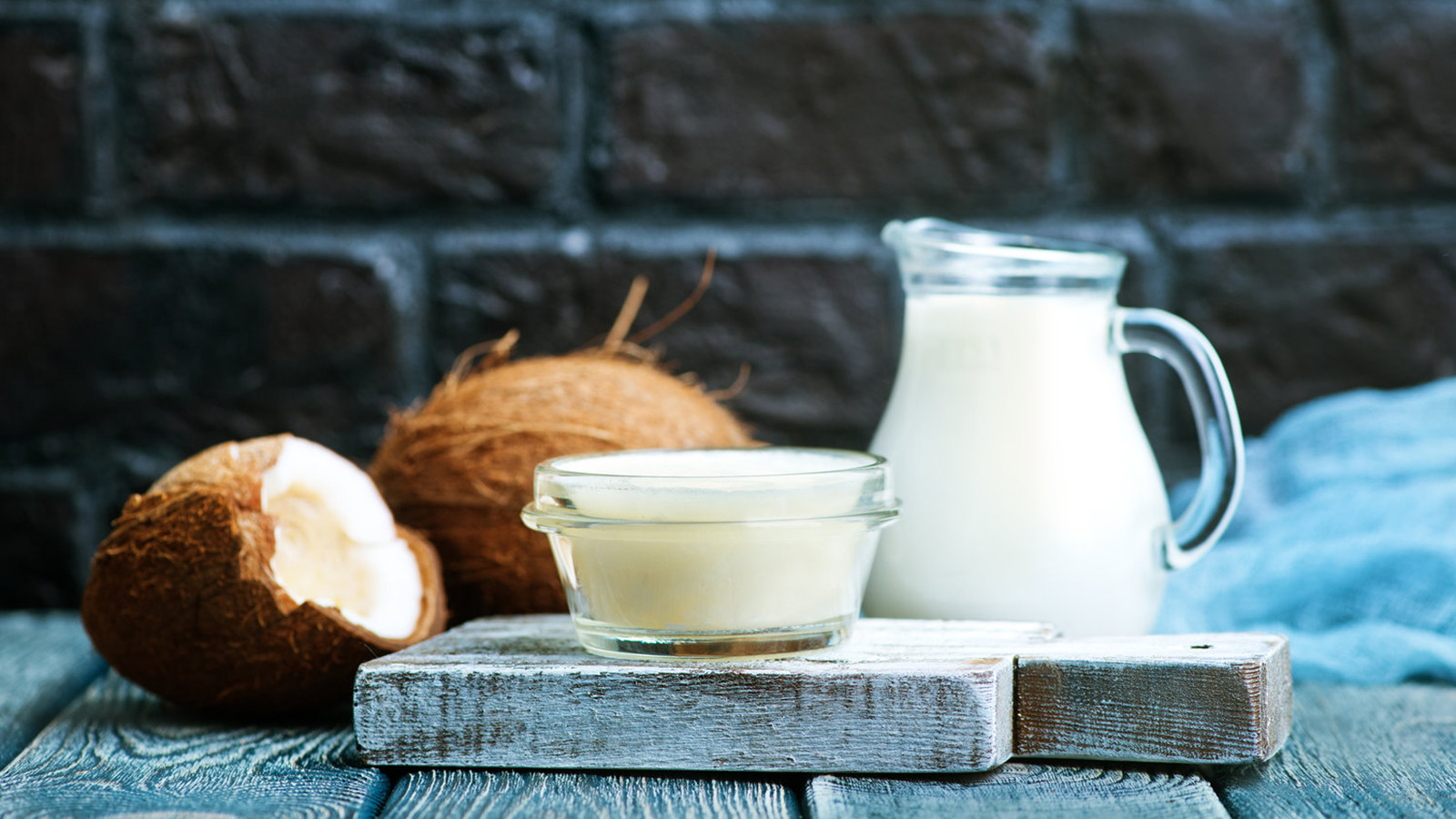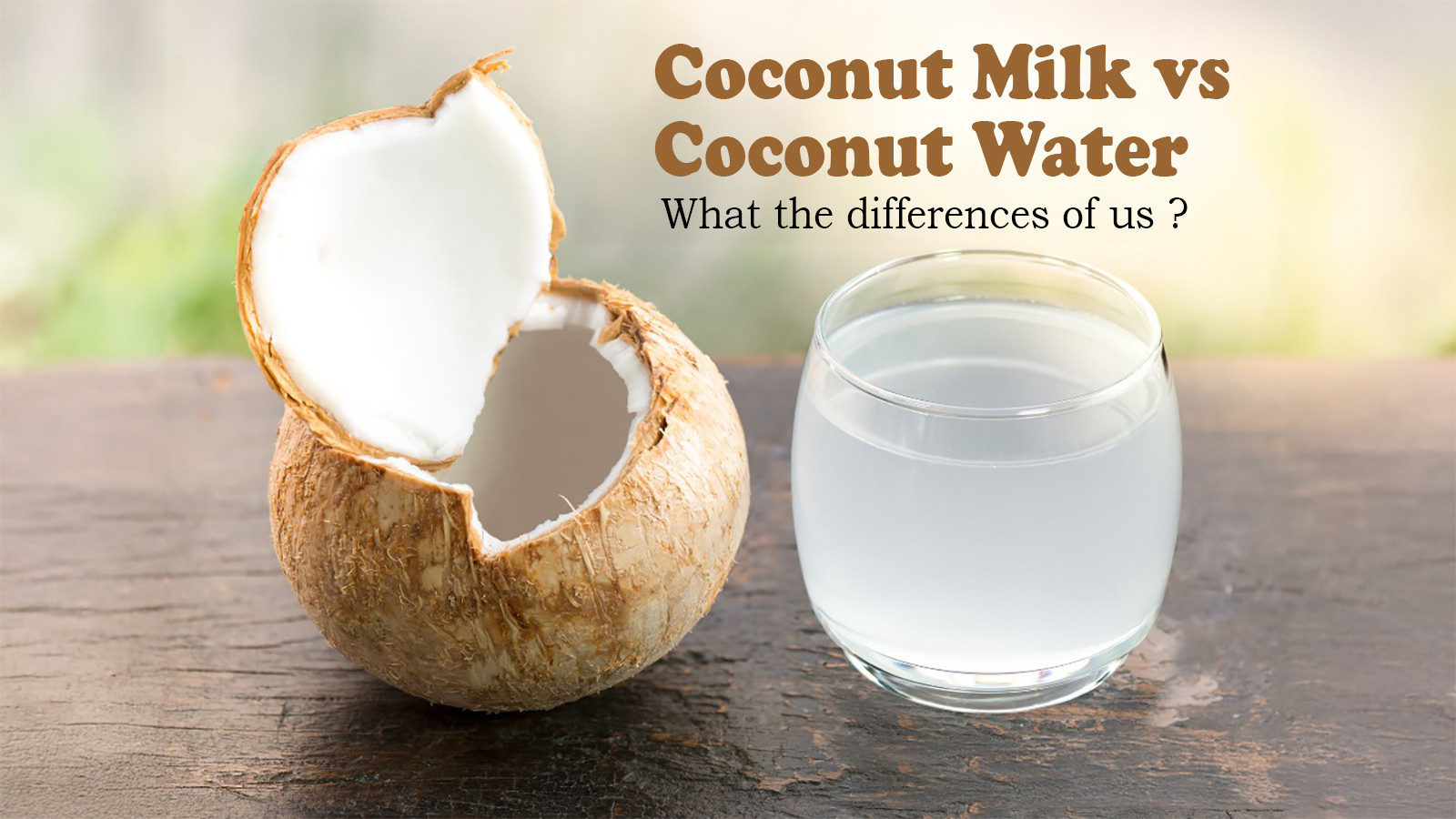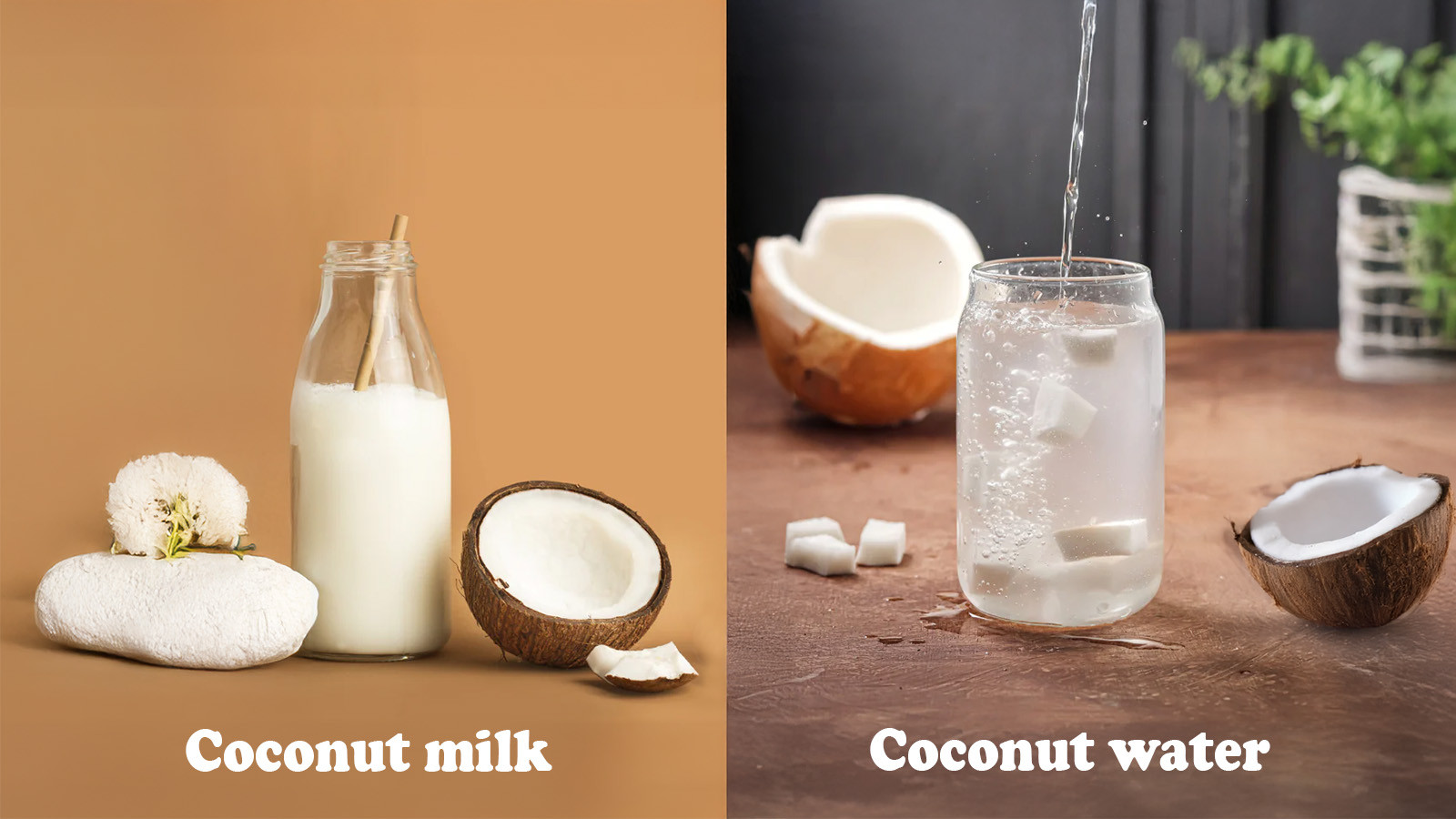Coconut milk and coconut water may come from the same source but are entirely different products with distinct characteristics. What makes them different, and why do they serve such distinct purposes? Exploring their differences will reveal the name and the coconut’s versatility and help you decide which one is best for your needs and preferences.
Conceptual differences between coconut milk and coconut water
Let’s first explore the conceptual differences between coconut milk and coconut water.
Coconut water
Coconut water is a clear, naturally occurring liquid found in young green coconuts that is primarily used as a beverage. Coconut water is known for its hydrating properties, and it is rich in electrolytes such as potassium, sodium, and magnesium, making it an excellent choice for hydrating the body. Its consistency and mild sweetness make it a popular natural alternative to sugary or processed drinks.

Coconut milk
Coconut milk is a smooth, opaque liquid made by blending mature coconut meat with water and straining the mixture. Unlike coconut water, it is a processed product with a thick, creamy texture, making it ideal for culinary use. Coconut milk is often used to add depth and flavor to various dishes, including curries, soups, desserts, and smoothies. Its higher fat content and strong coconut flavor make it a staple ingredient in cooking and baking, not just a standalone beverage.

Compare the coconut water and coconut milk nutrition facts in a cup
Fresh coconut water and fresh coconut milk are nutritious but differ significantly in calories, fat content, vitamins, and minerals. Below is a detailed comparison of their nutrition facts for a 1-cup (240ml) serving.
Coconut water nutrition facts (per 1 cup, 240ml)
Here is the nutritional breakdown:
- Calories: 45–60
- Total Fat: 0–0.5g
- Saturated Fat: 0g
- Cholesterol: 0mg
- Sodium: 250–400mg
- Potassium: 400–600mg
- Carbohydrates: 9–11g
- Sugars: 8–10g
- Dietary Fiber: 0–1g
- Protein: 1–2g
Fresh coconut water is prized for its high potassium content, which supports hydration and electrolyte balance. It is naturally low in fat and cholesterol-free, making it an ideal drink for light hydration.
Coconut milk nutrition facts (per 1 cup, 240ml)
The following is the nutritional composition of full-fat coconut milk:
- Calories: 445–550
- Total Fat: 48–57g
- Saturated Fat: 40–50g
- Cholesterol: 0mg
- Sodium: 15–45mg
- Potassium: 300–400mg
- Carbohydrates: 6–8g
- Sugars: 2–4g
- Dietary Fiber: 0–2g
- Protein: 4–6g
Fresh coconut milk is significantly higher in calories and fat due to its creamy texture, primarily from saturated fat. It is commonly used as an ingredient in cooking, such as in soups, curries, and desserts.
The difference between the uses and applications of coconut water and coconut milk
Fresh coconut water is a refreshing drink thanks to its natural sweetness and light texture. It is also a popular choice for use in smoothies, adding hydration and mild flavor. Additionally, coconut water is a natural sports drink due to its high electrolyte content, helping replenish minerals after physical activity.
Coconut milk, on the other hand, is primarily used in cooking. Its rich and creamy texture makes it a staple in dishes like curries, soups, and desserts, where it adds depth and flavor. It is also a versatile ingredient in baked goods and can serve as a dairy-free alternative to cream in recipes. Beyond cooking, coconut milk is sometimes used in beverages like creamy lattes or tropical smoothies, providing a luxurious, coconut-forward taste.

The difference between coconut water and coconut milk in the beverage industry
Coconut water: A natural and hydrating choice
Coconut water is widely used as a standalone drink, valued for its hydrating properties and natural, tropical flavor. It has found its way into various beverage categories, including sports and energy drinks, whose electrolyte content makes it an ideal choice for replenishing hydration. Additionally, coconut water is often infused with flavors like pineapple, mango, or lime to create refreshing blends. Its light, flavorful nature makes it a popular base for health-focused smoothies, enhancing their nutritional appeal without adding heaviness.
Notable product categories:
- Electrolyte-rich sports drinks
- Infused coconut water with tropical fruit flavors
- Cold-pressed juice blends featuring coconut water
Coconut milk: A creamy and indulgent ingredient
Coconut milk plays a different role in the beverage industry, primarily as an ingredient that brings creaminess and depth to indulgent drinks. It is widely used as a non-dairy alternative in specialty coffee drinks, such as lattes, cappuccinos, and iced coffees, catering to the growing demand for plant-based options. Coconut milk also serves as a key base for tropical cocktails like piña coladas, adding richness and a signature tropical flavor. Premium smoothies and dessert-style shakes contribute a luxurious texture and taste, elevating the drinking experience.
Notable product categories:
- Dairy-free milk alternatives for coffee and tea
- Tropical cocktail bases, such as piña coladas
- Plant-based protein shakes and creamy smoothies
Coconut water and coconut milk serve different purposes and cater to diverse preferences in the beverage market. Coconut water is perfect for hydration and light refreshment, making it an ideal choice for post-workout recovery or a revitalizing drink during hot weather. Coconut milk, on the other hand, is valued for its rich, creamy texture and is often used in creating indulgent beverages like smoothies, lattes, or tropical drinks. Both options offer distinct flavors and benefits, making them versatile choices for various drink experiences.

